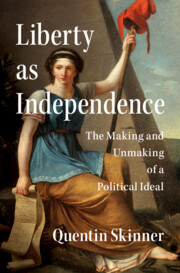Book contents
- Liberty as Independence
- Liberty as Independence
- Copyright page
- Contents
- Acknowledgements
- Conventions
- Introduction
- Part I Liberty and the Revolution of 1688
- 1 The Ideal of Liberty as Independence
- 2 The Legitimacy of the Revolution Debated
- Part II Liberty as Independence: The Ideal Entrenched
- Part III Liberty as Independence: The Ideal Betrayed
- Part IV A New View of Liberty
- Part V The Rival Views in Contestation
- References
- Index
2 - The Legitimacy of the Revolution Debated
from Part I - Liberty and the Revolution of 1688
Published online by Cambridge University Press: 23 January 2025
- Liberty as Independence
- Liberty as Independence
- Copyright page
- Contents
- Acknowledgements
- Conventions
- Introduction
- Part I Liberty and the Revolution of 1688
- 1 The Ideal of Liberty as Independence
- 2 The Legitimacy of the Revolution Debated
- Part II Liberty as Independence: The Ideal Entrenched
- Part III Liberty as Independence: The Ideal Betrayed
- Part IV A New View of Liberty
- Part V The Rival Views in Contestation
- References
- Index
Summary
Chapter 2. The removal of James II from the throne in 1688 and the settlement of the crown jointly on William and Mary gave rise to an extensive debate about the legitimacy of the new regime. Many wrote to celebrate the ending of arbitrary rule. Some commentators (notably James Tyrrell) focused on the final securing of the fundamental rights of the people in the manner promised by the ancient constitution of England. But others (notably John Locke) preferred to appeal to the natural rights of the people as the only sound basis for guaranteeing freedom under government. At the same time, however, many rejected the settlement of 1688. The Jacobites objected that William and Mary were merely usurpers, while in the course of the 1690s a group of ‘commonwealth’ writers began to argue that the crown and executive were failing to keep their promise to outlaw the use of arbitrary power. The chapter concludes by discussing the contributions of Molesworth, Trenchard and Toland to the development of ‘commonwealth’ claims about the policies that will need to be followed if the freedom of the people from subjection and dependence is to be secured.
- Type
- Chapter
- Information
- Liberty as IndependenceThe Making and Unmaking of a Political Ideal, pp. 44 - 66Publisher: Cambridge University PressPrint publication year: 2025

